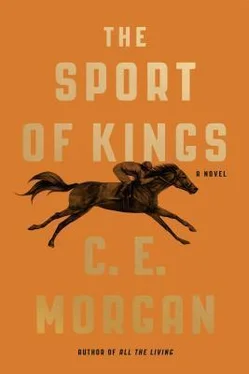There followed a reorientation of remaining resources: Stallion paddocks were arranged in two-acre units near the house with a yearling barn erected some way behind a stallion barn. The old whipping post was not uprooted in the redesign of the farm, but left to stand perversely in the path of an emerging thicket windbreak, so the evergreen bushes grew up around it like a rose around its thorn. The Osbournes’ land was purchased when they went bankrupt in the summer of 1968, so the old land of the silt bowl, which had once been Forge property before being sold in William Iver’s generation, was Henry’s and yours once again, and it came with a broodmare band and a foaling barn only thirteen years old and the assurance of hardy grass over limestone; also a sweet-tasting Stoner Creek streamlet that pooled in the bowl, glimmering there like gray ice on cloudy days.
Another note on display: Your father paints the plank fences wedding-dress white instead of black, an unnecessary expense. However, in the wild, male suitors often develop brightly colored, highly ornamented tails or wings that display genetic excess, which is to say wild tolerance of risk (see above), in order to secure a suitable mate and reproductive success. The female, frequently the choosier of the species, selects. Note how in this schema, the male and female are merely avenues to reproduction, dispensable agents of futurity.
A note on the 1 percent: The human is an organism defined by its 1 percent genetic difference from the chimp, which involves improved hearing, protein digestion, sophisticated speech, and all the other necessary conditions of humanity, not least of which is hope: in this case a horse. Hellbent is well balanced with a head neither too large nor too small, situated nicely on her neck over a slim swell of belly; driven by quarters that are strong but not stocky; legs set neither forward nor back but perfectly straight; unimpressive in her first races, but intriguing on paper; a gamble, your father’s roughcut gem, a daughter of Bold Ruler, showing some of his high temperament and nerve, if not his power at the mile and beyond.
But there follows disappointment: dejection at the frustration of design. During Hellbent’s life the broodmare band was expanded then culled, stallions were purchased and sold, mares crossed out and inbred, but there never came a horse that made the farm, or made your father. Hellbent herself became a solid producer of horses, including stakes winners, though a few broke down, overextended in distance by overeager trainers, and one died of colic in the pasture, its guts twisted like engorged ropes, striking its head against the ground in vain attempts to rise, so it had beaten itself to death before the vet could arrive.
Disappointment is compounded by perfection: Henry sees Secretariat, the big red colt by Bold Ruler out of Somethingroyal, at the 1972 Laurel Futurity, then again at next year’s Belmont, where the chestnut springs from the inside and establishes a lead along the backstretch against his rival Sham and ahead of Twice a Prince and My Gallant, firing out the first three quarters in 1:09⅘, at which point Sham begins to fall away under the scorching pace— Secretariat is widening now, he is moving like a tremendous machine, Secretariat by twelve, Secretariat by fourteen lengths— with Turcotte wild-eyed and asking for nothing and the grandstand rising with an oceanic roar around Henry, who stands transfixed as Secretariat takes the only purse of real value, greatness, charging under the wire thirty-one lengths ahead of Sham in 2:24, a record that stands even today.
But your father procured a mate that fateful day in Saratoga: a woman thin as a pin with a glassy blonde bob and lips painted burgundy, displaying near-perfect conformation with only minor defects: pigeon-toed with a hard voice; but also restlessness, the quality of perpetual dissatisfaction, a state which represents a subtle but very real threat to young prior to the age of separation; see Bowlby’s work on maternal deprivation, also Ainsworth, Winnicott, & Etc. You call this woman Mother. She is one-half responsible for your corporeal organization, your particular form of accumulated inheritance. Together with your father, she is a conduit of the great law, the Unity of Type.
And so you were born: into the Conditions of Existence. Our ignorance of the laws of variation is profound.
* * *
The Quarter is a cutting horse and the Morgan is a generalist. The Kentucky Saddle is a smooth ride, the Connemara a great jumper, the Mustang an independent. The Mongolian is an ancient primitive and the toady Exmoor is exceedingly rare. The Akhal-Teke has endurance, and the Belgian Draft the strength of ten. But only the Thoroughbred can claim to be the fastest horse in the world — and here it was resident in their lush spring fields, bathing in the sunlight, calling antiphonally over Henrietta’s head as she spent herself each and every day on her father’s holdings, his very earth.
Her eyes were always open.
She saw wheat rounds as they rolled off the tongue of the baler.
Doves lined into the air when a cat came and parted the grasses.
Clouds were piled and red-tipped like a sunshot mountain range inverted.
The faces of the tall horses were riddles.
Perhaps her parents could discover their meaning? Her father was not in the stallion barn, not in the orchard, so she ran in search of her mother and found Judith in the master bedroom, reclining against a landslide of silken pillows, magazines fanned around her, speaking urgently under her breath on the phone to one of her sisters. With her pale skin and blonde hair, she almost disappeared into the sheets the way fences vanish into snow in the wintertime.
Henrietta barnstormed the room, her arms wide. “Mother, I want to know why—”
Judith shrank into her pillow, covered the receiver with one palm, and said, “Jesus, Henrietta. A little warning next time.”
“I want to know—”
“Hold on,” her mother said into the phone, struggling to sit up straight and pressing the receiver between her breasts. She gathered herself, arranging her good-night smile, cheer like bright paint over irritation. Then she leaned over, offering her cheek. “Henrietta, you know I don’t like it when you yell indoors. Now kiss me good night. Did you say good night to the horses?”
Henrietta sighed, her question abandoned. “Yes,” she said very simply, leaning over the magazines, crumpling their glossy pages as she kissed her mother’s cheek.
“Good girl,” said Judith, clearing her throat. “Now go to bed, and your father will be in shortly to tell you a story. Go on.”
“Okay.”
But when Henrietta straightened up from the bed, her mother said very suddenly, “Henrietta, wait — tell me, did you have a good day?”
“Yes.”
“And did you have fun?”
Henrietta shrugged. “Yes.”
Then, Judith’s crystalline blue eyes narrowed. “But — are you happy?”
Henrietta laughed the evergreen laugh of the very young; of course she was happy. It was the natural state of childhood.
“Well, good night.”
She was almost through the door when a hard, desponding voice halted her one more time. “But you would tell me if you were unhappy, right?”
Impatiently: “Yes, Mother.”
“Promise?”
“I promise.” Then only a dark, empty space remained where the child had stood. Sighing so loudly that Henrietta heard it on the threshold of her own room, Judith said, “Yes, I’m still here.”
* * *
This is your story, Henrietta. It was 1783, during the waning heat of the Revolutionary War. Thousands of soldiers had already died on the field, or were injured in their drive to beat back the British. Your great-great-greatest-grandfather was one of those injured at Yorktown, and he received a bounty land warrant offering him surveyable acreage west of the Blue Ridge Mountains. This whole area was part of Virginia at the time, and that’s why we are Kentuckians first and Virginians second and Christians third. Well, Samuel Forge was more than eager to go. The state of his birth was too populous and too loud, and he was saddled with a pioneer’s roving mind, which demands space. So Samuel set out west and brought with him a slave, who was smart with black magic and a very fine cook, and together they traversed the mountains. But those mountains were dark and forbidding. The two of them followed the old buffalo blaze and battled mightily against the elements, wary of Shawnee to the north and Cherokee to the south, because in those days a scalp was very valuable. The way was rough and full of dangers, but Samuel persevered. When they finally reached the Gap, they discovered a cave, an opening right there in the sheer wall of rock. Now his slave had a special feeling about this cave and wanted to explore it, but first they needed protection from the gods, so they sacrificed four bulls that they found wandering around in the open land around the Gap, and then his slave led the way down into the dark. This was a cave that led to the underworld. They wandered in the dark past Dread and Hunger and Want and Sleep and Toil and War and Discord, who had wild, long, horrible hair and was the worst thing Samuel Forge had ever seen, and they walked past the Tree of Dreams, but it didn’t catch any of Samuel’s dreams. He was too slippery and his dreams too big to be caught. Down, down, down they went until they came to the milling crowds of the unhappy dead that gathered on the bank of a river as wide and muddy as the Ohio. A boatman rowed them across the river, and they walked onto the fields of heaven, and all the noble dead were alive like gods. They crowded around him with stories on their tongues, but Samuel Forge had come to look for only one man — his father, Andrew Cooper Forge, who had died back in Virginia and never again seen his son once he’d set out to make his own way in the world. Samuel wanted his forgiveness for past wrongs, and he did indeed discover him there on the green underground fields of heaven. The old man was making a census of all his descendants, and had in trust all their futures and their fates, everything they would be and everything they would do, all the Forges, who in their time would march out of the cave into the bright daylight on the Kentucky side of the Gap. He was gathering his numbers, and I was there and you were there, even though we hadn’t come to be yet—
Читать дальше
Конец ознакомительного отрывка
Купить книгу












